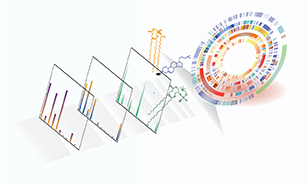Dresden, 12.03.2019
New Shotgun Lipidomics Method for Molecular Profiling of Adipose Tissue
The Paul Langerhans Institute Dresden, a partner of the DZD, and the University Hospital Carl Gustav Carus joined their forces with Lipotype GmbH and developed a new shotgun lipidomics method for the molecular profiling of brown and white adipose tissue. The results of this collaborative work have now been published in the journal 'Molecular Metabolism'.
Adipose tissue consists of more than 99% of storage lipids, mainly triglycerides that are stored within the cell in so-called lipid droplets. Nonetheless, the remaining 0.5-1% of lipids are sufficient to build a metabolically active cell in all its complexity. Despite the enormous importance of adipose tissue in human health and diseases (like diabetes), no standardized method existed so far, to quantitatively and reproducibly analyze its lipidome. Thus, Paul Langerhans Institute Dresden (PLID), German Center for Diabetes Research (DZD), the Institute for Clinical Chemistry and Laboratory Medicine of the University Hospital Carl Gustav Carus Dresden (IKL) and Lipotype GmbH chose to tackle this urgent need. Their joint vision of an omics-driven clinic, fueled the development of a shotgun lipidomics protocol for adipose tissue.
Shotgun lipidomics technology enables to identify a vast number of lipid molecules and study their roles in biological systems, and it can be applied to cell cultures, fluids and tissues. However, the predominance of triglycerides in adipose tissue impairs the detection of the remaining cellular lipidome, making its quantification challenging. “Our newly developed shotgun lipidomics method features a lipid extraction process, which was specifically designed to overcome this challenge”, says Dr. Ünal Coskun, senior author of the study. His research team applied the new protocol to investigate tissue-specific and diet-related differences in lean and obese adipose tissues. “We were able to observe that brown adipose tissue exhibited a distinct lipidomic profile. It responded to high-fat diet by altering its lipid composition and shifting towards that of white adipose tissue”, explains Dr. Michal Grzybek, who is first author of the study. “Interestingly, diet-induced obesity promoted an overall remodeling of the lipidome, where all observed adipose tissues featured a significant increase in longer and more unsaturated triacylglyceride and phospholipid species”, continues Dr. Christian Klose, head of research and development at Lipotype GmbH.
This new and validated protocol wants to facilitate the systematic molecular profiling of adipose tissue by providing high reproducibility and linear dynamic range for all lipid classes. Besides covering all types of adipose tissue, it can be used for fatty organs, and can be integrated with further omics approaches used in pre-clinical research. “I am excited to see that, inspired by envisioning an omics-driven future clinical environment, PLID, IKL and Lipotype developed a method with the potential to advance our understanding of the molecular metabolic dynamics involved in the pathogenesis of obesity-associated disorders”, summarizes Prof. Triantafyllos Chavakis, director of IKL at the University Hospital Carl Gustav Carus Dresden.
Original publication:
Grzybek, M.; Palladini, A.; Alexaki, V. I.; Surma, M. A.; Simons, K.; Chavakis, T.; Klose, C. & Coskun, Ü. Comprehensive and quantitative analysis of white and brown adipose tissue by shotgun lipidomics. Molecular Metabolism. doi: 10.1016/j.molmet.2019.01.009
https://www.sciencedirect.com/science/article/pii/S2212877818311141?via%3Dihub
Contact:
Dr. Ünal Coskun
Paul Langerhans Institute Dresden of the Helmholtz Center Munich at the University Clinics and Medical Faculty Carl Gustav Carus at TU DresdenMembrane Biochemistry
Fetscherstraße 74
01307 Dresden
Germany
Phone: +49 351 796 5340
Fax: +49 351 796 36699
e-mail: uenal.coskun(at)tu-dresden.de
Internet: https://tu-dresden.de/med/mf/plid/forschung/Coskun
Press contact

Birgit Niesing
niesing(at)dzd-ev.de
+49 (0)89 3187-3971

